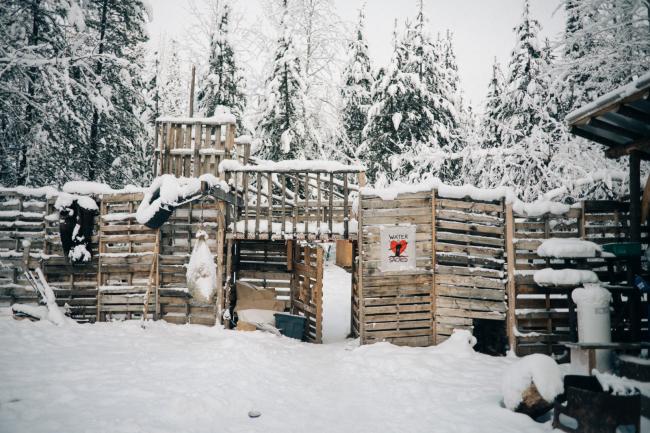Articles Menu

January 24th 2020
You might be living on unceded land.
To be more precise: the Maritimes, nearly all of British Columbia and a large swath of eastern Ontario and Quebec, which includes Ottawa, sit on territories that were never signed away by the Indigenous people who inhabited them before Europeans settled in North America. In other words, this land was stolen. (It's worth noting that territories covered by treaties also weren't necessarily ceded — in many cases, the intent of the agreements was the sharing of territory, not the relinquishing of rights.)
What to do about it, however, is deeply complex — and legal questions about how to handle claims to unceded land have become a subject of public discussion as members of the Wet’suwet’en Nation in northeastern British Columbia have reoccupied their territory and attempted to block the Coastal GasLink pipeline. Similar cases over Indigenous land titles are moving through courts across Canada.
Canada’s Constitution is clear that Indigenous land rights exist, said Benjamin Ralston, a lecturer and researcher at the Indigenous Law Centre at the University of Saskatchewan. But in practice, fights over exactly what those rights are can take decades to resolve in court or in treaty negotiations, revealing “cognitive dissonance” in the system.
“The real problem is, what do we do about it now, while these slow processes are proceeding?” he said.
In the case of the Wet’suwet’en and Coastal GasLink, at issue is a divide between the traditional Wet’suwet’en legal system, Canada’s legal system, those who have stood to protect the land in question and those who want to see the pipeline built.
Under Wet’suwet’en law, authority over the nation’s 22,000 square kilometres of unceded territory lies with hereditary chiefs from five clans, who oppose the pipeline. However, there are also five elected band councils created by Canada’s colonial Indian Act, and some of the councils have supported the project.
A 1997 Supreme Court of Canada decision affirmed that the provincial government can’t extinguish Wet’suwet’en rights to their land. However, the court also sent the case back from a second trial that hasn’t yet happened, leaving key questions unresolved.
Last year, the RCMP violently arrested Wet’suwet’en people and supporters in the disputed area, with the Guardian reporting earlier this year that police had been prepared to use lethal force. Earlier this month, the RCMP set up a checkpoint to control access to the area after a B.C Supreme Court judge extended an injunction to force out the Wet’suwet’en in the camps and allow construction on the pipeline to continue.
“We are not trespassing,” Ta'Kaiya Blaney, one of several Victoria, B.C., activists arrested and released after a protest supporting the Wet’suwet’en earlier this week, said in a video posted on Facebook.
Wet’suwet’en Nation territory in northeastern British Columbia is just one example of a dispute over unceded land.
“Coastal GasLink is trespassing, those cops are trespassing. They have no jurisdiction to violate Indigenous Peoples and Indigenous youth on stolen land.”
The Wet’suwet’en are far from the only ones asserting their title to their traditional lands.
In Nova Scotia, Mi’kmaq people have pushed for recognition of their unceded territory. In Ottawa, several Algonquin groups claim the land that Parliament Hill and the Supreme Court of Canada sit on. And in 2014, Tsilhqot'in Nation in B.C. became the first to prove title to their land in court.
In 2017, about 140 groups of Indigenous people who never signed treaties were negotiating with Canada’s federal government, the New York Times reported.
Several court cases have reaffirmed that the Canadian government has a duty to consult Indigenous people in cases that will impact their rights, which is meant to be an extra protection while land-title cases get resolved. But that protection is imperfect: duty to consult “is not necessarily going to give you the full benefit of stopping a project,” Ralston said.
In general, courts have also been reluctant to allow Indigenous land claims as a reason to block injunctions.
In a broader sense, however, there are international considerations as well. In November, B.C. passed a bill aligning its laws with the United Nations Declaration on the Rights of Indigenous Peoples (UNDRIP), a landmark document that, among other things, protects Indigenous Peoples’ right to self-government and right to consent to resource-development projects on their territories.
B.C. is the first Canadian jurisdiction to implement UNDRIP — the document was passed by the UN General Assembly in 2007 over Canada’s objections, and the country has so far been reluctant to formally implement it. It's not clear how the document could play in future disputes.
In the case of Coastal GasLink, B.C.'s independent Human Rights Commission, Amnesty International and the UN Committee on Racial Discrimination have all criticized the provincial government, saying Coastal GasLink violates UNDRIP principles.
B.C. Premier John Horgan, meanwhile, has said the province’s law is not retroactive and Coastal GasLink will go ahead.
Editor's Note: This story was updated at 8:26 p.m. on Jan. 25, 2020 include additional information about treaties.
[Top photo: Inside the Gidimt'en Checkpoint on Wet'suwet'en territory in December 2019. The camp was dismantled by Coastal GasLink contractors in early 2019, and then rebuilt and reoccupied. Photo by Michael Toledano]